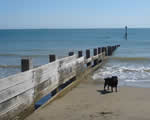 Mynd i'r prif gynnwys
Mynd i'r prif gynnwys
Gwefan llywodraeth y DU
Nodwch fod gan y wefan hon system allweddumynediad llywodraeth y DU
Trefn llywio pennaf
dolenni i dudalennau eraill yn yr adran hon
Y cartref a’r gymuned - Nodwch, os gwelwch yn dda, na ddiweddarir yr adran hon bellach

Reporting stranded dolphins, whales and porpoises

If you discover a dolphin, whale or porpoise stranded on a beach or in shallow waters, find out who to contact. Also, find out what precautions to take when going near the animal and how to keep it calm if it’s still alive.
Steps to take on finding a live and stranded dolphin, whale or porpoise
If you find a stranded dolphin, whale or porpoise (otherwise known as a ‘cetacean’) that’s still alive you should follow these steps:
- contact the rescue team
- give information about the animal’s location and condition
- keep the animal calm
How to tell if the animal is alive
You can usually tell if the animal is alive because it will be breathing through its ‘blowhole’ (the animal’s breathing hole on top of its head). However, some species of whales can hold their breath for up to an hour. If you aren’t sure if the animal is still alive, tell whoever you call to request a rescue team.
1: Contact the rescue team
When you find a stranded dolphin, whale or porpoise, the most important thing is to phone for help from a specially trained rescue team as quickly as possible. The team will examine the animal and decide whether it can be returned to the sea.
Who to phone in England or Wales
If you are at the coast in England or Wales, then phone either:
- the British Divers Marine Life Rescue on 01825 765 546
- the Royal Society for the Prevention of Cruelty to Animals on 0300 1234 999
Who to phone in Scotland
If you are at the coast in Scotland, then phone either:
- the British Divers Marine Life Rescue on 01825 765 546
- the Scottish Society for Prevention of Cruelty to Animals on 0131 339 0111
Precautions to take near stranded dolphins, whales and porpoises
You should take care since dolphins, whales and porpoises can pass on diseases to people or cause injury, so:
- avoid the whale or dolphin’s breath so that you don’t come into contact with any infections that may be harmful to your health
- wash your hands thoroughly after handling whales or dolphins
- avoid the animal’s teeth and its tail, which can cause serious injuries if the animal moves suddenly because it’s distressed
- keep children away from the stranded whale or dolphin
2: Give information about the animal’s location and condition
Try and give the rescue team as much information as possible about the animal’s location and condition.
If possible, let them know:
- exactly where the animal is
- whether it is stranded on the beach, amongst rocks or in the sea
- if it’s in the shade or direct sunlight
- a description of the animal which may help the rescue team to decide what the species is
- how many times a minute its blowhole is opening
- what the weather and sea conditions are like where the animal is stranded
- if any attempts have already been made to push the stranded animal back into the sea
- your mobile number if you have one so that you can be contacted by the rescue team
3: Keep the animal calm
Make sure you follow the precautions explained above when you go near the stranded animal. If you keep the animal calm, wet and supported upright, it’s more likely to survive, so:
- keep any crowds well away from the stranded whale or dolphin
- support the animal so that it is upright (with its blowhole on top) and dig small trenches under its ‘pectoral’ fins, which are just behind its head
- keep the animal wet by using wet towels, sheets or seaweed or spraying it with water
- take care not to allow water to go down the animal’s blowhole
It is also very important not to release the animal before the rescue team arrives. The team needs to fully assess the animal to find out what condition it is in.
If the animal is dead
The whale or dolphin may be dead if it isn’t breathing through its blowhole – the animal may also smell badly. If this is the case, you should contact the following organisations and give details of the location of the dead animal. If you are on the coast in:
- England, phone the Natural History museum on 020 7942 5155
- Wales, phone Marine Environmental Monitoring on 01348 875 000
- Scotland, phone the Scottish Agricultural College on 01463 243 030 (07979 245 893 out of office hours)
Train to become a mammal medic
If you would like to be trained to help rescue stranded animals like whales and dolphins, follow the link below to enrol on a training course.
 Facebook
Facebook Twitter
Twitter StumbleUpon
StumbleUpon Delicious
Delicious Reddit
Reddit